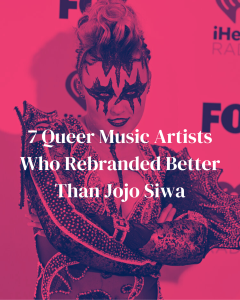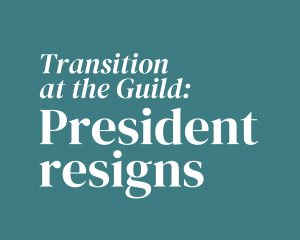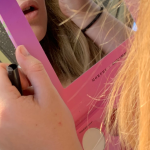The music industry of today feels very different to the way I imagined it to be last century, in the time of Woodstock ‘69, Rolling Stone magazine, and the way music and the connections between artists and fans were the most important things in the industry. Maybe it’s just media like Almost Famous and Daisy Jones and The Six that have instilled in me a romanticised idea of what the music industry could be, or has it really changed?
I don’t mean to imply that musicians these days don’t know how to connect with their fans, but there is that indescribable sense that we have lost something along the way. Nowadays, the music industry feels more like an artless machine: concert tickets are under $100 if you’re lucky, musicians are required to spend more time on social media in order to connect with and ‘influence’ their fans, and live music events are more about getting drunk and what you’re wearing than the actual music.
So what’s to blame for it all? Several factors have, over time, been able to change the way the music industry works – most notably the rise of social media, the changes to music journalism, and the slow economic downfall of the 21st century.
The infamous invention of social media can be blamed for the destruction of a lot of things, the music industry included. With the help of streaming services like Spotify, we are now listening to more music than we ever have before as a society, but record sales are at an all time low. This means artists are increasing their concert and merchandise prices in order to actually make money, but, since record sales are down, record companies want a cut of these profits.
We’re seeing that less and less young people are even attending live music shows at all, and when they are, they are spending an upsetting amount of that time on their phones. The rest of the young people are at home, either because they can no longer afford to go out or because they have lost the innate ability to connect with other people and talk to strangers, which we can once again blame on social media. We know that social media’s entire purpose is to connect people, but studies show that we have never felt so disconnected from the people around us.

I don’t mean to pile the blame on Gen Zers (I’m one myself) and there certainly are those of us who value music and follow proper gig etiquette, but I think we can all agree that our phones have played a part in all of our burgeoning anti-social behaviour. Then we have the streaming services, like Spotify and Apple Music, who pay artists next to nothing when people stream their music – on average Apple Music pays $0.01, and Spotify only $0.003 per stream. This means people don’t have to buy physical copies of albums anymore, but those who do are paying exorbitant prices.
But what’s the alternative? I’m a (maybe not so proud) Spotify user – I have proclaimed on occasion that my favourite day of the year is Spotify Wrapped day – and I don’t plan on deleting it any time soon. Now that we have streaming services, who would agree to reverting back to a time where you have to collect the music and the devices to play them on?
Maybe it’s the lack of true music journalism that has sparked the death of the music industry, or perhaps it is only a symptom of its dying. Tyler the Creator recently spoke critically about modern-day music journalism and how it has changed in the time of social media. He spoke about how important it is for artists to actually talk about their music, rather than rehashing ‘beef’ with other artists, going sneaker shopping, or eating chicken wings on ‘Hot Ones’.
“We’re at a point where a musician who you know for music is being interviewed on a platform about music, talking in detail about music, his passion and what he’s known for, and people are like ‘why does he keep doing that?’… I hope that overall every musician gets to a point where they sit and speak about their music and the music that they love and the conversation about music just comes back because the fact that you can get every song for ten dollars. What that subconsciously does is have people not respect music,” Tyler the Creator said in an interview with Nardwuar late last year.
Has the music industry changed because we, as a society, no longer have the same connection to our values, something that the music we listen to is meant to symbolise? The music industry has become more like a marketing industry. Artists have to sell an image, an idea of themselves, a physical manifestation of the values they are trying to project, and whoever sells that idea best gets the most money and the most fans. It doesn’t really sound like music anymore, does it? Social media has become our main method of connection to artists we like. We find ourselves curious about the clothes they wear, the friends they have, the things they believe in. Why? What do these things have to do with music? Fans ridicule and criticise musicians when they remain silent about a certain topic or express their less than conventional opinions. It’s weird that I even have to say this, but musicians are not meant to be our role models. They make music, and that should be their only responsibility.
Music is still very important to a lot of people. Who can say that music hasn’t changed, helped, or comforted them in some way? People still value music, we just don’t have the same avenues to enjoy and immerse ourselves in it the same way people used to. We are lacking a sense of human connection and becoming overstimulated by everything else going on in our lives: working more than we ever have for less, living through a pandemic, and a financial crisis, which is diminishing our available time to do the things we love. Music streaming services feed into this increased loneliness we already have, encouraging us to enjoy something alone that is meant to be enjoyed together. Music is about connection at its very core, not isolation.
Maybe Tyler the Creator is right, and the answer is in the revitalisation of music journalism. Maybe we should be spending more money on the physical music that we love, whether that’s CDs, records, or, god forbid, cassettes, and less time liking photos of our favourite artist’s current vacation. Because there is a special feeling to be able to hold music in your hands rather than looking at a photo of the album cover on your phone. Of course, we live in a time where money is scarce and a lot of people can’t afford to buy their music. But when the world we live in often seems cold and hopeless, why shouldn’t we spend a little money on the things that make life worth living? And for a lot of people, that is music.







